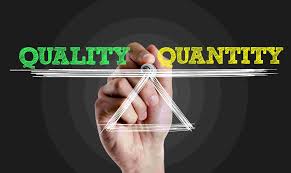
Anticipate and Navigate: Mastering the Art of Proactive Problem-Solving
In the grand theater of life, one of the most invaluable skills you can possess is the ability to anticipate and mitigate potential problems before they escalate into full-blown catastrophes. From personal relationships to professional endeavors, the capacity to look ahead and spot potential pitfalls is a hallmark of resilience and foresight. So, how can you hone this essential skill and become a proactive problem-solver in your own life? Let's delve into some strategies:
1. Develop Strategic Thinking: Strategic thinking involves taking a step back and considering the bigger picture. Train yourself to think strategically by analyzing past trends, identifying patterns, and anticipating future developments. Ask yourself: What are the potential consequences of my actions? What are the various scenarios that could unfold? By adopting a strategic mindset, you'll be better equipped to foresee potential problems and take preemptive action to address them.
2. Stay Informed and Educated: Knowledge is power when it comes to anticipating and preventing problems. Stay informed about current events, industry trends, and relevant developments in your field of interest. Continuously educate yourself through reading, research, and networking with experts in your field. The more you know, the better equipped you'll be to identify emerging issues and proactively address them before they escalate.
3. Conduct Risk Assessments: Just as businesses conduct risk assessments to identify potential threats to their operations, you can apply the same principle to your own life. Take the time to assess potential risks and vulnerabilities in various aspects of your life, such as finances, health, relationships, and career. Consider both internal and external factors that could impact your well-being and take proactive measures to mitigate these risks.
4. Practice Scenario Planning: Scenario planning involves envisioning different possible futures and preparing for them accordingly. Take time to brainstorm various scenarios that could unfold in different areas of your life, from best-case to worst-case scenarios. Then, develop contingency plans for each scenario, outlining specific actions you would take to address potential problems and minimize their impact. By thinking through various possibilities in advance, you'll be better prepared to respond effectively when challenges arise.
5. Cultivate Critical Thinking Skills: Critical thinking involves the ability to analyze information objectively, evaluate arguments, and make informed decisions. Cultivate your critical thinking skills by questioning assumptions, considering alternative perspectives, and weighing evidence carefully. When faced with potential problems, approach them with a critical eye, considering all available information before jumping to conclusions or making hasty decisions.
6. Build Strong Support Networks: Surround yourself with a diverse network of trusted advisors, mentors, and friends who can offer valuable insights and perspectives. Seek out individuals who excel in anticipating and solving problems in their own lives and learn from their experiences. When confronted with challenges, don't hesitate to seek advice and guidance from your support network. Sometimes, an outside perspective can help you identify blind spots and find creative solutions to complex problems.
7. Stay Flexible and Adaptive: No matter how well you anticipate and plan for potential problems, life is unpredictable, and unforeseen challenges will inevitably arise. Stay flexible and adaptive in your approach, remaining open to changing circumstances and adjusting your plans accordingly. Embrace uncertainty as an opportunity for growth and innovation, rather than a source of anxiety. By remaining nimble and adaptable, you'll be better equipped to navigate whatever challenges come your way.
In the grand theater of life, one of the most invaluable skills you can possess is the ability to anticipate and mitigate potential problems before they escalate into full-blown catastrophes. From personal relationships to professional endeavors, the capacity to look ahead and spot potential pitfalls is a hallmark of resilience and foresight. So, how can you hone this essential skill and become a proactive problem-solver in your own life? Let's delve into some strategies:
1. Develop Strategic Thinking: Strategic thinking involves taking a step back and considering the bigger picture. Train yourself to think strategically by analyzing past trends, identifying patterns, and anticipating future developments. Ask yourself: What are the potential consequences of my actions? What are the various scenarios that could unfold? By adopting a strategic mindset, you'll be better equipped to foresee potential problems and take preemptive action to address them.
2. Stay Informed and Educated: Knowledge is power when it comes to anticipating and preventing problems. Stay informed about current events, industry trends, and relevant developments in your field of interest. Continuously educate yourself through reading, research, and networking with experts in your field. The more you know, the better equipped you'll be to identify emerging issues and proactively address them before they escalate.
3. Conduct Risk Assessments: Just as businesses conduct risk assessments to identify potential threats to their operations, you can apply the same principle to your own life. Take the time to assess potential risks and vulnerabilities in various aspects of your life, such as finances, health, relationships, and career. Consider both internal and external factors that could impact your well-being and take proactive measures to mitigate these risks.
4. Practice Scenario Planning: Scenario planning involves envisioning different possible futures and preparing for them accordingly. Take time to brainstorm various scenarios that could unfold in different areas of your life, from best-case to worst-case scenarios. Then, develop contingency plans for each scenario, outlining specific actions you would take to address potential problems and minimize their impact. By thinking through various possibilities in advance, you'll be better prepared to respond effectively when challenges arise.
5. Cultivate Critical Thinking Skills: Critical thinking involves the ability to analyze information objectively, evaluate arguments, and make informed decisions. Cultivate your critical thinking skills by questioning assumptions, considering alternative perspectives, and weighing evidence carefully. When faced with potential problems, approach them with a critical eye, considering all available information before jumping to conclusions or making hasty decisions.
6. Build Strong Support Networks: Surround yourself with a diverse network of trusted advisors, mentors, and friends who can offer valuable insights and perspectives. Seek out individuals who excel in anticipating and solving problems in their own lives and learn from their experiences. When confronted with challenges, don't hesitate to seek advice and guidance from your support network. Sometimes, an outside perspective can help you identify blind spots and find creative solutions to complex problems.
7. Stay Flexible and Adaptive: No matter how well you anticipate and plan for potential problems, life is unpredictable, and unforeseen challenges will inevitably arise. Stay flexible and adaptive in your approach, remaining open to changing circumstances and adjusting your plans accordingly. Embrace uncertainty as an opportunity for growth and innovation, rather than a source of anxiety. By remaining nimble and adaptable, you'll be better equipped to navigate whatever challenges come your way.















